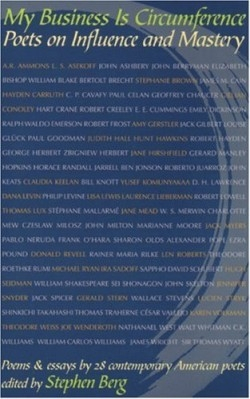It looks like you've stumbled upon a page meant to be read by our code instead of viewed directly. You're probably looking for this page.
My Business Is Circumference
Poets On Influence and Mastery
The “circumference” of the title remains ambiguous in its application to this rewarding anthology. Twenty-eight contemporary poets responded to the editor’s request that they investigate the “idea of mastery” in a short essay, presenting three to five influences on one of their poems. Berg’s introduction, scholarly and attributive, does not clarify the concept, although it does include Einstein’s words recognizing the human being as needing to free himself from the “optical delusion of his consciousness.”
Individuals free themselves by “widening [their] circle of compassion.” Berg assigns this obligation to poets. Surprisingly, this definition does not limit the collection to poets working in the lyric-narrative tradition. Many of the twenty-eight are lesser known. Eleven are women. Some write from a circumference that means periphery or margin rather than the mainstream center. Even if, as poet Amy Gerstler explained, the poets were asked to “try to pick works in the public domain” as their influences (skewing the sampling to Blake, Pope, Shakespeare, and Whitman), their own poems and the sometimes unique staging of the essays allow for insights into process and the esoteric criteria for unusual forms that surprise and enlighten.
L.S. Asekoff’s essay is a series of “Transcendental Etudes” inseparable from “iii.29.86,” a meditation on the “mystery of mastery.” The poem disrupts its own lyric beginning and ending. Silences created by fragment phrases make the body of the poem. Subtitled prose poetry further disrupts the “Etudes,” with sources listed in a final end note titled “iii.29.99.”
Stephanie Brown accompanies her poem, “No Longer a Girl,” an open form of mostly end-stopped lines of understated narration, with prose readings from Nathanael West and James Cain. Hunt Hawkins works in Frost, O’Hara, and Olds to examine his idea of “transparent” language that “assumes no distance between word and referent.” Jane Hirshfield introduces “pebble poems” in which “the poem seems to hold still, and yet the reader moves.” Gerstler is wary of the “mustachioed arrogance” of the word “mastery,” and Judith Hall calls it “stasis.” Claudia Keelan struggles to “find a way to use the pronoun ‘I’ plurally,” seeking “a method of composition that allows opposites to coexist without disintegration?” Gillian Conoley considers the “void” a creative departure “where one must write, all alone.” Theodore Weiss subverts that idea by writing in collaboration with his wife, Renee, after the medieval debate, a question and answer form producing “variations on the body versus the spirit.”
Berg is a poet known for nurturing the new. In 1969, he co-edited Naked Poetry and in April, 2000, Body Electric, America’s “best poetry from the American Poetry Review.” My Business Is Circumference will intrigue apprentice poets, teachers, and readers fascinated by writers creatively exploring their own material and philosophical foundations.
Disclosure: This article is not an endorsement, but a review. The publisher of this book provided free copies of the book to have their book reviewed by a professional reviewer. No fee was paid by the publisher for this review. Foreword Reviews only recommends books that we love. Foreword Magazine, Inc. is disclosing this in accordance with the Federal Trade Commission’s 16 CFR, Part 255.
